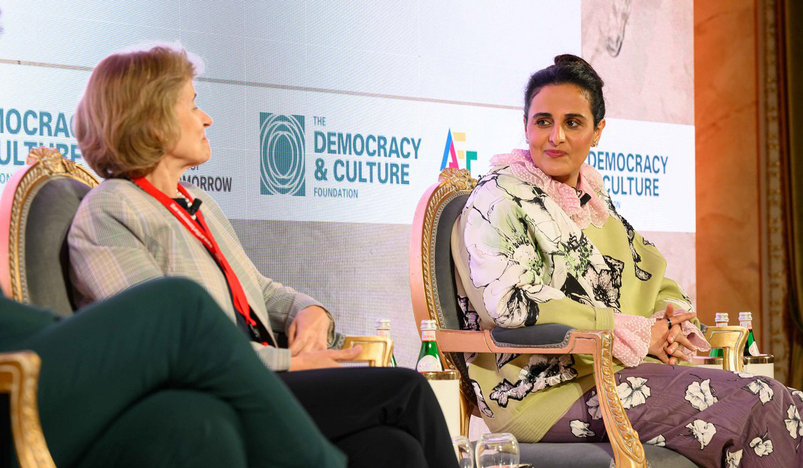
Sheikha Al Mayassa bint Hamad Al-Thani
HE Chairperson of Qatar Museums Sheikha Al Mayassa bint Hamad Al-Thani joined leading international advocates of the arts at Art for Tomorrow, a summit exploring the social and economic impact of the arts, held in Florence and Solomeo, Italy, from 26 30 April 2023. With discussions moderated by senior New York Times journalists, Art for Tomorrow convened an influential group of speakers including artists, government officials, leaders of cultural institutions, and patrons of the arts and featured a variety of panels and special events relating to some of the most pressing issues affecting the arts today.
Her Excellency Sheikha Al Mayassa participated in the conversation "Heritage for Tomorrow," which focused on how organizations are managing to preserve valued cultural assets while addressing urgent challenges such as mass tourism and climate change.
Speaking in her role as Chairperson of Qatar Museums, which preserves and promotes the nation's cultural heritage as part of its mandate, Sheikha Al Mayassa said, "When it comes to Qatar, from the very beginning, our strategy for culture and museums was to develop our local and regional culture and celebrate our heritage: Islamic culture, Arab culture, and our Qatari identity. For example, when it came to the National Museum of Qatar, the jewel of the museum is the palace of Sheikh Abdullah bin Jassim, the son of the founder of Qatar, and we preserved it as it is. We wanted people to appreciate the size and scale, and see how their family lived, because showing how people lived in the past is interesting for us to study and understand. The notion of people living with their family is something that still exists today in our society, and we want to preserve that, even as we are building modern institutions and being part of a more global and connected world." Joining Her Excellency in the conversation were Irina Bokova, former Director-General of UNESCO; and Andreas Gorgen, General Secretary, German Ministry of Culture. The discussion was moderated by New York Times journalist Farah Nayeri.
During the panel, Her Excellency hailed Qatar's exemplary cultural heritage protection strategies while underscoring the importance of heritage preservation to Qatar's national identity and its people.
Her Excellency said, "Heritage preservation is not just about showing people beautiful things and informing them about important issues. It is about thinking about how our current habits need to change and show how everyone can participate in making a difference." She continued, "One area where Qatar has been very strategic is in repurposing and upcycling historic buildings to create new cultural experiences. We have chosen the Flour Mill, which is still active and is the primary source of bread throughout Doha, as the site for the Art Mill Museum. We did the same with the Fire Station which was an old civil defence building and was converted into our artist in residency space. We could have developed new buildings in the desert and started from scratch, but instead of creating new buildings we have chosen a more sustainable strategy that also honours our history." In addition to Her Excellency Sheikha Al Mayassa, Qatar was well-represented at other Art for Tomorrow events throughout the summit. Qatari artist Shouq Al Mana discussed how her practice is rooted in culture, identity, and tradition that combines the past and present, and Qatar Museums Deputy CEO Sheikha Reem Al Thani hosted a conversation about the arts ecosystem and promoting the arts in other sectors.
Art for Tomorrow was the first of two significant cultural initiatives taking place in Italy this spring featuring Qatari participation. The second, the 18th International Architecture Exhibition - La Biennale di Venezia, will open in Venice in May, at which time Qatar will have a presence through two exhibitions presented by Qatar Creates: the documentary exhibition Building a Creative Nation, the first presentation outside the country of Qatar's next generation of cultural institutions, and Onomatopoeia Architecture, featuring works from acclaimed Japanese architect Kengo Kuma, which is sponsored by Qatar Creates. Both exhibitions will be on view at ACP-Palazzo Franchetti throughout the Architecture Biennale from 14 May through 26 November 2023.
Building a Creative Nation focuses on five new cultural venues being developed by Qatar Museums in Qatar with internationally acclaimed architectural practices ELEMENTAL, Herzog & de Meuron, Office for Metropolitan Architecture (OMA), Philippe Starck, and UNStudio. All the new developments will be operated by Qatar Museums, which is responsible for preserving and enlarging Qatar's cultural endowment by overseeing the country's growing network of museums, heritage sites, festivals, public art program, and more.
Projects featured in Building a Creative Nation are: Art Mill Museum - Architect: ELEMENTAL led by Alejandro Aravena; Lusail Museum - Architect: Herzog & de Meuron; Qatar Auto Museum - Architect: Office for Metropolitan Architecture (OMA), led by Rem Koolhaas and Samir Bantal; Qatar Preparatory School - Architectural concept: Philippe Starck; Dadu, Childrens Museum of Qatar - Architect: UNStudio.
These new developments build on the legacy of Qatars continuing investment in the world-class museums and cultural spaces that have opened in the country over the last 15 years. They include: Museum of Islamic Art, architect: I. M. Pei (2008); Mathaf: Arab Museum of Modern Art, architect: François Bodin (2010); Fire Station, architect: Ibrahim Al Jaidah (2015); Qatar National Library, architect: OMA (2017); National Museum of Qatar, architect: Jean Nouvel (2019); M7, architect: John McAslan + Partners (2021); and 3-2-1 Qatar Olympic and Sports Museum, architect: Joan Sibina (2022).
(QNA)
.jpg)
Qatar Secures Place Among the World's Top 10 Wealthiest Nations
.jpg)
Hamad International Airport Witnesses Record Increase in Passenger Traffic

Saudi Arabia: Any visa holder can now perform Umrah

What are Qatar's Labour Laws on Annual Leave?
Leave a comment